

Commentary Select
Commentary Select




Preaching the Word - Jeremiah and Lamentations
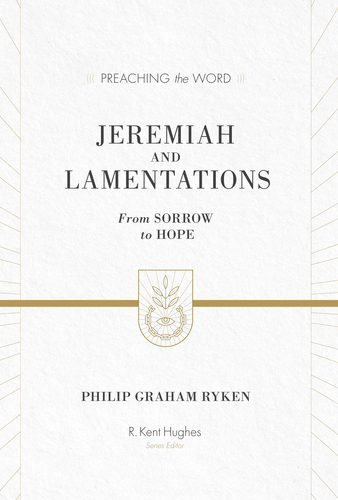
Preaching the Word - Jeremiah and Lamentations
The “Weeping Prophet,” the rabbis said, began wailing the moment he was born. Jeremiah had reason to weep—he witnessed the devastating consequences of life without God.
Sadly, the relativism Jeremiah saw in ancient Israel predominates in America today. That’s why his words are so relevant for our lives. Better than anyone else, Jeremiah exemplifies—through his courage, passion, even his sufferings—how believers can live for God in a society that has turned against Him.
While the book of Jeremiah shared the last, desperate days of the Jerusalem he loved, Lamentations expresses the cries of his heart. Yet they reveal more than the prophet’s grief—they are an attempt to reflect on the meaning of human suffering. Lamentations gives voice to the deepest agonies, with the hope that some comfort may come from crying out to God for mercy. Together the two books illustrate the eternal principle that man reaps what he sows.
It is a lesson the world—and the church—needs to learn. With the heart of a pastor and the knowledge of a scholar, Philip Graham Ryken applies these words of life to us today. His commentary will not only help you understand and teach from these spiritually relevant books, but also it will inspire you with the courage and passion of God’s personal call for you to live in these times.
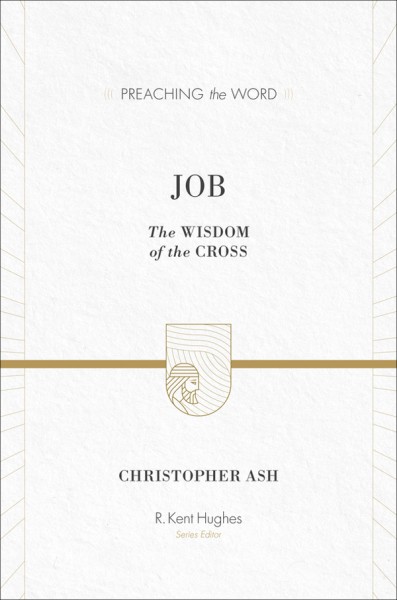
Life can be hard, and sometimes it seems like God doesn’t even care. When faced with difficult trials, many people have resonated with the book of Job—the story of a man who lost nearly everything, seemingly abandoned by God.
In this thorough and accessible commentary, Christopher Ash helps us glean encouragement from God’s Word by directing our attention to the final explanation and ultimate resolution of Job’s story: the life, death, and resurrection of Jesus Christ. Intended to equip pastors to preach Job’s important message, this commentary highlights God’s grace and wisdom in the midst of redemptive suffering.
Taking a staggeringly honest look at our broken world and the trials that we often face, Ash helps us see God’s sovereign purposes for adversity and the wonderful hope that Christians have in Christ.
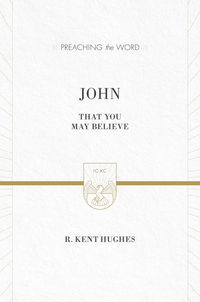
While each of the Gospels presents Christ with a distinct emphasis, the Gospel of John focuses on His greatness. As the timeless Creator-God of the universe. As the Word made flesh. As the gracious Lover of our souls who is the only Way to the Father.
Instead of detailing the facts and events of His earthly life, as the other Gospel writers did, John concentrates on the meaning of Jesus' words and the message of His works, clearly presenting Him as the long-awaited Messiah with one mission in mind—to do the work of the Father who sent Him.
The apostle's tremendous vision of Christ has, time and time again, opened the eyes of unbelievers to who Jesus is and to His singular role in our redemption. But its effect on Christians is equally profound, because in John's account the serious reader finds an ongoing, expanding view of the Savior's greatness and the wondrous meaning of His ministry. A view that widens and deepens with each return to this Gospel.
Follow along with Pastor Kent Hughes in this engaging, verse-by-verse commentary as he leads you through this magnificent Gospel. His careful exposition and wise application will guide you to a richer understanding of not only God's greatness, but of His great goodness to us all.
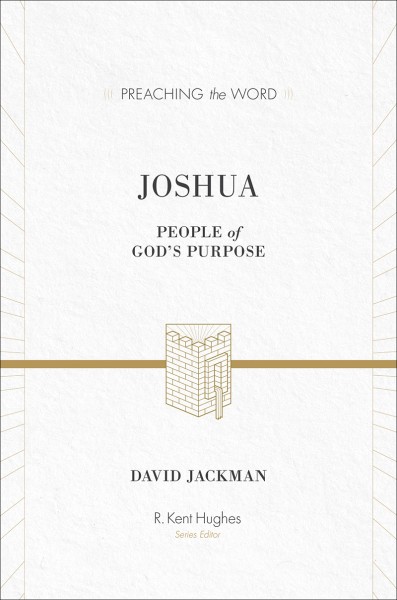
Following closely on the heels of the Exodus story, the book of Joshua recounts the mighty acts of God as he fulfills his promises to Abraham, Isaac, and Jacob. It is, quite profoundly, a testimony to God’s awesome power and enduring faithfulness.
Written to aid pastors in their preaching and churches in their reading, this accessible commentary guides us through the history of Joshua’s leadership in Israel and God’s direction of his covenant people to their promised “rest” in the land of Canaan.
With warmth and wisdom, David Jackman ultimately encourages us to trust God’s promises more deeply and obey his commands more wholeheartedly—that we might fully enjoy all the blessings secured for us in and through our Joshua—Jesus Christ.
Preaching the Word - Judges and Ruth
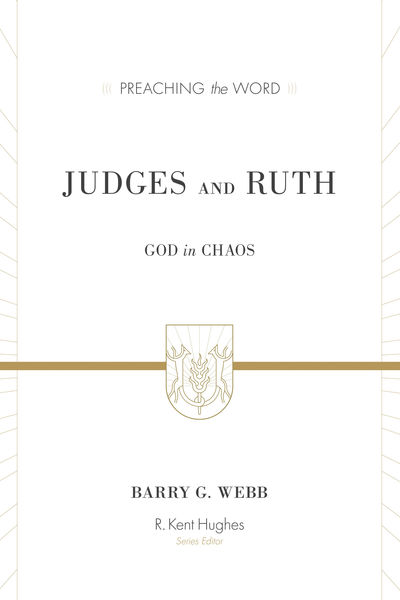
Preaching the Word - Judges and Ruth
The book of Judges powerfully demonstrates the chaos that can arise when sin reigns in people’s hearts. In contrast, the book of Ruth offers a message of redemption and hope following disorder. Set in a time when everyone “did what was right in his own eyes,” both books work together to highlight God’s faithfulness in the midst of Israel's disobedience.
Exploring the stories of figures such as Gideon, Samson, Naomi, and Ruth, this accessible commentary emphasizes the countless ways God protected and preserved his people in the Bible. Experienced preacher Barry Webb explores important connections between Judges and Ruth, reminding us of God’s promises to his people and offering practical applications for daily life—pointing us toward the hope of the coming King of kings, Jesus Christ.
Preaching the Word - Leviticus

Preaching the Word - Leviticus
This new Preaching the Word commentary reveals how the regulations detailed in Leviticus point to the perfection and fulfillment of Christ in the New Testament age.
It is the message that God spoke to his people through Moses as they prepared to depart for the Promised Land. It details regulations for holy living and sacrificial worship in Old Testament Israel. But does Leviticus have anything to say to Christians today?
Knowing that readers of the Bible often get hung up on the seeming irrelevance of Leviticus, Kenneth Mathews counters with this insightful Preaching the Word commentary. His chapter-by-chapter analysis reveals much about not only the demands of a holy God but about the kind of relationship he wants with his people and his standards for worship in any age.
As Mathews illuminates the significance of Israel's sacrificial system and symbols, he draws parallel after parallel to Jesus as their perfect fulfillment. His commentary will train pastors, teachers, and serious readers in how Leviticus foreshadows the saving work of Jesus, and the many ways God made accommodation for human sin through Christ.
Preaching the Word - Luke Volume 1
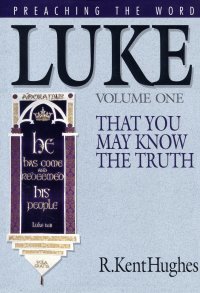
Preaching the Word - Luke Volume 1
Luke's carefully researched and "orderly account" of the life of Christ is one of the finest pieces of historical writing in all of ancient literature. Yet it also accomplishes its divinely appointed—and more personal—purpose: that people of every century "may know the truth."
"Those who study Luke cannot stay the same," says commentator R. Kent Hughes. "He took great pains to present the gospel with maximum power under the guidance of the Holy Spirit. The result is a compelling story." Especially when it is read and studied in sequence, as Hughes has done in these two volumes.
Luke's breadth—with entire sections that are recorded nowhere else in the New Testament—and its celebratory tone set it apart from the other Gospels. Luke resounds with praise to God from beginning to end. Taking readers from just prior to Jesus' birth to His ascension into heaven, this spirited report communicates the joy and the glory of the earthly life and ministry of Jesus Christ. And Pastor Hughes's insightful commentary, which unveils both Luke's approach and purpose in recording the life of Christ, and the implications of that life, adds compelling perspective to help you communicate God's Word more effectively.
Luke the historian—with his painstaking reporting—will make you certain about the truth of not only his Gospel, but the gospel. Luke the theologian—with his careful recounting of Christ's mercy and compassion—will touch you with God's love and grace. And Luke the physician—with his heart for people, especially the less privileged—will help you to love others more deeply. This may well be the only commentary you'll ever need to teach and preach the power, the celebration, the glorious message of Luke's beloved Gospel. Part of the Preaching the Word series.
Preaching the Word - Luke Volume 2
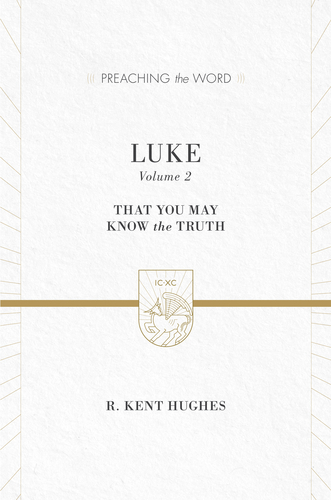
Preaching the Word - Luke Volume 2
Luke's carefully researched and orderly account of the life of Christ is one of the finest pieces of historical writing in all of ancient literature. Yet it also accomplishes its divinely appointed purpose: that people of every century "may know the truth."
The breadth of Luke's Gospel–with entire sections that are recorded nowhere else in the New Testament–and its celebratory tone set it apart from the other Gospels. Taking readers from just prior to Jesus's birth to his ascension into Heaven, this spirited report communicates the joy and the glory of the earthly life and ministry of Jesus Christ. Additionally, Pastor Hughes's insightful commentary unveils Luke's approach and purpose in recording the life of Christ, adding compelling perspective to help you communicate and understand God's Word more effectively.
Luke the historian–with his painstaking reporting–will make you certain about the truth of not only his Gospel, but also the gospel. Luke the theologion–with his careful recounting of Christ's mercy and compassion–will touch you with God's love and grace. And Luke the physician–with his heart for people, especially the less privileged–will help you to love others more deeply. Ultimately, those who study Luke's Gospel cannot stay the same.
Preaching the Word - Mark Volume 1
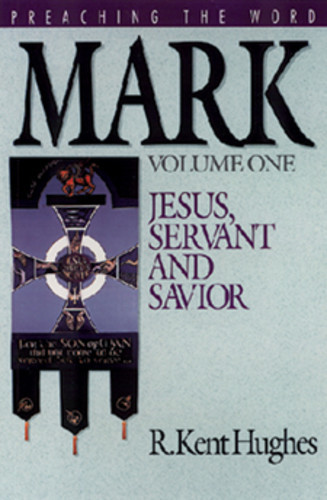
Preaching the Word - Mark Volume 1
In our age of aggressive evil and apathetic faith, the Gospel of Mark resounds with the dynamic power of the Lord Jesus Christ. Perhaps the most dramatic and action-packed of the synoptic Gospels, Mark's writing continues to inspire increased commitment in the Church at large.
Mark's portrayal of Christ as the Servant-Savior takes on fresh relevance in these masterful expositions by respected pastor/author R. Kent Hughes. With careful exegesis, the author draws from the text many practical lessons for everyday living and effective ministry. His numerous illustrations reflect wide interests, extensive reading, and years of experience pastoring and counseling those who seek to know Christ and walk in his ways.
This first volume covers Mark 1:1-9:1, the main part of Jesus' teaching and healing ministry. As the Messiah confronts evil spirits, heals the helpless, and challenges the orthodox, a final conflict with the religious establishment becomes inevitable—and we, like the ancient world, must decide if we will acknowledge him as our Lord and Savior.
Those who preach, teach, and study will find this book a gold mine of helpful information. With divisions and outlines that are never forced, but flow naturally from the text, Mark will be a great boon to those charged with communicating the Word, and to all who seek to grow in their faith through personal Bible study. Part of the Preaching the Word series.
Preaching the Word - Mark Volume 2
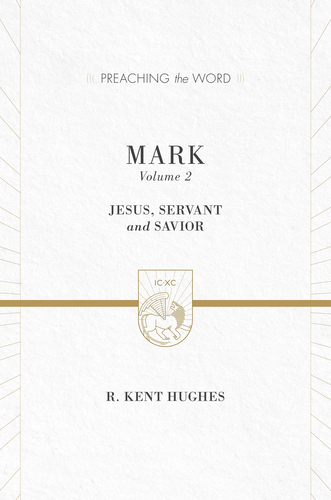
Preaching the Word - Mark Volume 2
This second volume covers Mark 9:2-16:20, the culmination of Jesus's ministry on earth. Seen in glory on the Mount of Transfiguration, challenged by religious skeptics, the Christ moves inexorably toward the cross, where history's greatest battle would be fought and won. And so we, like the ancient world, are confronted with the crucified and risen Christ and must decide if we will acknowledge him as our Lord and Savior.
Thus in our age of aggressive evil and apathetic faith, the Gospel of Mark resounds with the dynamic power of the Lord Jesus Christ. Perhaps the most dramatic and action-packed of the Synoptic Gospels, Mark's writing continues to inspire increased commitment in the Church at large.
Mark's portrayal of Christ as the Servant-Savior takes on fresh relevance in these masterful expositions by respected pastor/author R. Kent Hughes. With careful exegesis, the author draws from the text many practical lessons for everyday living and effective ministry. His numerous illustrations reflect wide interests, extensive reading, and years of experience pastoring and counseling those who seek to know Christ and walk in his ways.
Those who preach, teach, and study will find this book a gold mine of helpful information. With divisions and outlines that are never forced, but flow naturally from the text, Mark will be a great boon to those charged with communicating the Word, and to all who seek to grow in their faith through personal Bible study.
Preaching the Word - Matthew

Preaching the Word - Matthew
Jesus is King. Standing as a central theme of the Gospel of Matthew, Jesus’ kingly authority has profound implications for our lives today—changing the way we view the world, interact with others, and respond to blessings and hardships.
In this reader-friendly commentary, seasoned pastor Doug O’Donnell leads us through the first book of the New Testament, highlighting key themes and offering contemporary illustrations for preaching. Drawing on years of pastoral experience, O’Donnell helps us to see how Matthew’s various emphases—including Jesus’ messianic titles, fulfillment of Old Testament prophecy, teaching on the kingdom of heaven, and present and future role as judge—all relate to Christ's kingship over all of creation.
Full of biblical insights aimed at both pastors and laypeople, this volume ultimately highlights Matthew’s call to all people to worship and obey Jesus, our humble King and gracious Savior.
Preaching the Word - Numbers
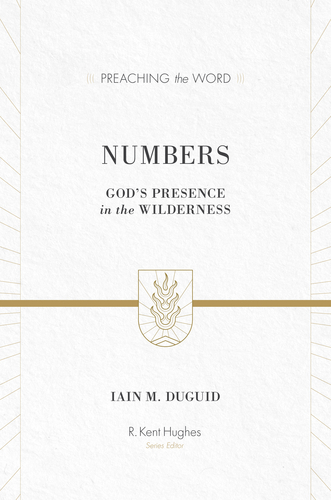
Preaching the Word - Numbers
The book of Numbers tells the story of Israel’s experience, ranging from their exodus out of Egypt to their entrance into the Promised Land. The lives of two generations are recorded: the first lacking in faith and receiving their just punishment from God, and the second believing the Word of God and so entering into their inheritance as his children.
Like those generations of Israelites, Christians today are also on a journey between events of deepest significance—from the work of Christ that provides our exodus from bondage to sin and death to Jesus’ second coming that ushers his children into the true and final promised land of heaven.
Author Iain Duguid aids both pastors and laypeople on this journey by explaining the profundities of the biblical text, especially its less transparent portions, and communicating the lasting message of God’s devotion to those who follow him in faith.
Preaching the Word - Philippians
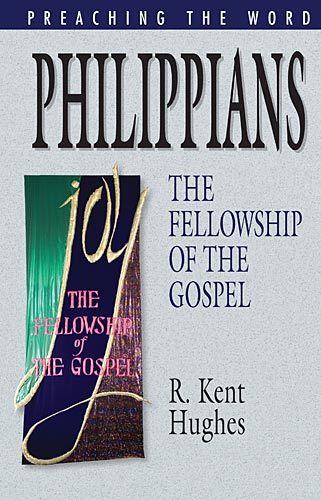
Preaching the Word - Philippians
The four chapters of Philippians contain some of the most-quoted and beloved passages in Scripture: "For me to live is Christ, and to die is gain," "Rejoice in the Lord always," "Do not be anxious about anything," "I have learned in whatever situation I am to be content." Yet in our familiarity with the Apostle Paul's words to his favorite church, we must be careful not to miss the deeper themes, says commentator R. Kent Hughes. Themes such as the robust fellowship and unity that Paul shared with the Christians at Philippi based on their mutual commitment to the gospel.
Theirs was a partnership we rarely see today—between people who were bound together in the great cause of unfurling the gospel flag in cities, countries, and other cultures—undergirded by Paul's central call to let their "manner of life be worthy of the gospel of Christ." It was a joyous cause, a unity, a manner of life that should be ours as well.
The characteristics of such true Christian conduct and spirit are detailed throughout this epistle and this commentary, with every aspect ultimately centering in Christ. Hughes's faithful exposition and application will reveal how much Philippians is about Christ and about people in Christ Jesus, as well as about people who are in the joyful fellowship of the gospel together because they are in Christ. Part of the Preaching the Word series.
Preaching the Word - Proverbs
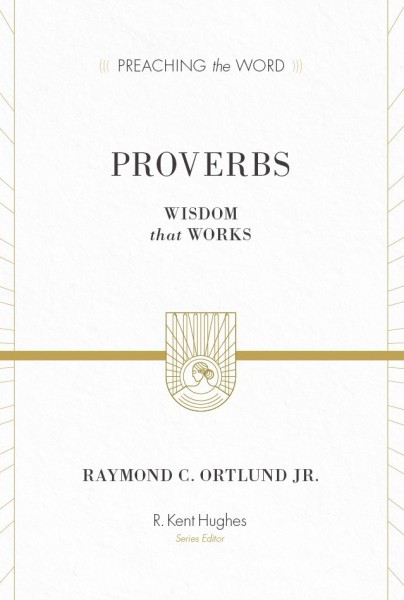
Preaching the Word - Proverbs
How exactly does one become wise? With the overwhelming flood of information and opinion in our times—much of it a mixture of spin, sound bites, and trivialities—it is crucial we turn back to the Bible and pay close attention to the deep insights that have stood the test of time.
Proverbs 1:20 tells us that “Wisdom cries aloud in the street, in the markets she raises her voice.” The wisdom of God does not stand aloof, but instead graciously moves toward us, into the world where we live and struggle day by day—offering us her very best, if we will only listen.
Pastor and teacher Ray Ortlund unpacks the book of Proverbs in twenty-one straightforward sermons, providing a biblical worldview on everything from money, sex, and power to that of the daily routines of an average life. Drawing relevant parallels from ancient culture to present day, he helps us understand how the book of Proverbs is practical help for ordinary people going through everyday life.
Most importantly, Ortlund shows how the Proverbs point to Jesus and his counsel for the perplexed, his strength for the defeated, his warning to the proud, his mercy for the broken. With careful treatment of the Scriptures and uncomplicated language, Proverbs: Wisdom that Works bridges the gap between real-life experience and the scholarly depth of many commentaries.
Preaching the Word - Psalms 1-41
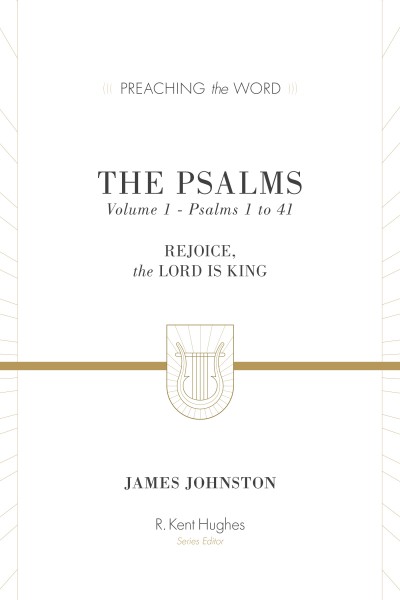
Preaching the Word - Psalms 1-41
The Psalms are treasured poetry that reflect the prayer and praise of ancient Israel. Every generation opens the Psalms for inspiration, comfort, hope, and encouragement.
They’re also are a rich source of truth about God, humanity, and salvation. The authors of the New Testament understood this, quoting the Psalms more than any other Old Testament book to establish key doctrines. The Psalms tell the story of God’s anointed king, his kingdom, and his people. They point forward to the Messiah—David’s Greater Son who reigns forever and ever.
In the first volume of a three-volume commentary on the Psalms, pastor James Johnston walks readers through Psalms 1 to 41, offering exegetical and pastoral insights along the way. Accessible and engaging, this resource will help anyone interested in studying, teaching, or preaching the Bible read the Psalms in a deliberately canonical and Christ-centered way.
Preaching the Word - Psalms 42-106
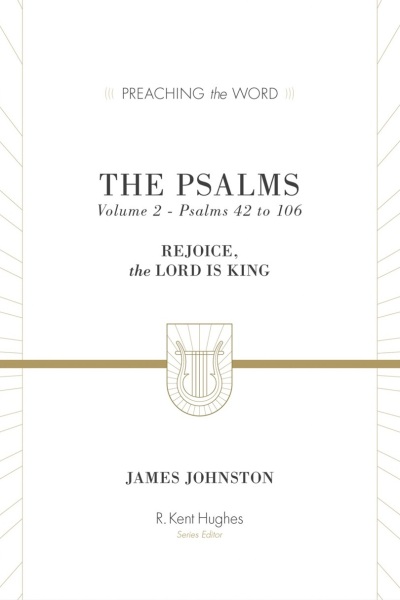
Preaching the Word - Psalms 42-106
Volume 2 of Preaching the Word’s Accessible Commentary on the Psalms Explores Chapters 42–106
The Psalms is one of the most widely loved books of the Bible. A source of instruction for our prayers, inspiration for our songs, and consolation for our tears, these biblical poems resound with the whole spectrum of human emotion and teach us to hope in God each and every day. In the second volume of a 3-part commentary on the Psalms, pastor James Johnston walks readers through chapters 42–106, offering exegetical and pastoral insights along the way.
Edited by R. Kent Hughes, the Preaching the Word expository series is an essential resource for anyone interested in studying, teaching, or preaching the Bible.
- Expository Commentary on the Psalms: In-depth study explores more than 60 individual psalms and explains how they fit together in Scripture
- Accessible: Written by pastors for pastors, this commentary is also an accessible resource for students and laypeople
- Part of the Preaching the Word Series: This is volume 2 of a 3-part commentary on the Psalms; volumes for other books of the Bible are also available
Endorsements
“James Johnston’s masterful exposition of the Psalms is theologically rich, pastorally wise, and spiritually rewarding. He clearly explains the distinctiveness of each psalm and then shows, in the light of the New Testament, how each psalm ultimately points forward to fulfillment in Christ. Even Christians who have read the Psalms for their entire lives, as I have, will find refreshing new insight in page after page of this excellent book!” - Wayne Grudem, Distinguished Research Professor Emeritus of Theology and Biblical Studies, Phoenix Seminary
“Psalms will be a treasured volume in this series. The original text is taken seriously and the gospel is made clear. In reading it, my own affections for Christ were delightfully energized. Johnston weds his love for God’s poetry to his heart, which is so joyfully pledged to God’s people.” - David R. Helm, Senior Pastor, Christ Church Chicago; Chairman, The Charles Simeon Trust
“While being sensitive to the original historical context of the Psalms as the prayer and songbook of Israel, Johnston is keenly aware that there is a Christocentric end to which the Psalms point and a Son in whom they find fulfillment, who is Israel’s promised Messiah. Because of this, Johnston recognizes all the Psalms are messianic, and understood in this way means the Psalms are also the Christian’s prayer, song, and life book. Reading this commentary results in thanksgiving and worship. Johnston’s excellent commentary is a great addition to the Preaching the Word series. I commend it to you as both an aid to your preaching and as a companion to your devotional reading and praying of the Psalms.” - Gregory C. Strand, Executive Director of Theology and Credentialing, Evangelical Free Church of America; Adjunct Professor of Pastoral Theology, Trinity Evangelical Divinity School
“More excellent fodder for sermons from this first-rate resource for preachers.” - Josh Moody, Senior Pastor, College Church, Wheaton, Illinois; President, God Centered Life Ministries
James Johnston (PhD, Trinity Evangelical Divinity School) is senior pastor of Camelback Bible Church in Paradise Valley, Arizona. He has led workshops on expository preaching for over fifteen years and is an instructor for the Charles Simeon Trust. He and his wife, Lisa, have four children.
Preaching the Word - Revelation
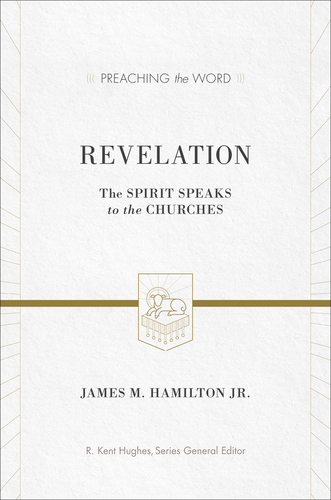
Preaching the Word - Revelation
In the book of Revelation, God unveils the world as it really is, identifying an unseen spiritual war and announcing a very real day of judgment. As the end approaches, we need to be convinced that Jesus is reigning as the risen King. We need to have him speak to the situation in our churches. We need to see how God will pulverize wickedness, answer those who oppose him, and establish his eternal kingdom. Revelation has exactly what we need.
Useful for personal study, as well as for preaching and teaching, the thirty-seven sermons in this volume have a clear structure and even include helpful charts and tables to highlight key themes and literary elements. In each sermon, professor and pastor James Hamilton grabs the reader’s attention, raises awareness of a real need, and states the main point of the biblical text. In addition to explaining the meaning of each passage, Hamilton connects the main ideas to applicable analogies and actionable points.
Revelation is a prophecy of epic proportions and Hamilton invites readers to love God and his people by expositing this revelation of Jesus, and to say along with the apostle John, “Come, Lord Jesus.”

Few Christians would dispute that the book of Romans is one of the most powerful and influential books ever written. After all, Paul’s epistle has been the written force behind some of the most significant conversions of church history: St. Augustine was convicted of his sin after reading some verses from the thirteenth chapter; Martin Luther recovered the doctrine of salvation by faith from his study of Romans 1:17; John Wesley felt his heart “strangely warmed” and transformed while listening to the reading of Luther’s preface to the book of Romans; and John Bunyan was so inspired as he studied the great themes of Romans that he wrote the immortal Pilgrim’s Progress. There is no doubt about the power of the book of Romans.
Pastor Kent Hughes invites us now to experience the same power that was exhibited in the lives of great Church leaders such as Augustine, Luther, Wesley, and so many others. The fundamental truths expressed in Paul’s letter—the themes of justification by faith, abounding grace, and freedom from sin—come to life as we explore the book that has so challenged and nourished followers of Christ for centuries.
Preaching the Word - The Sermon on the Mount
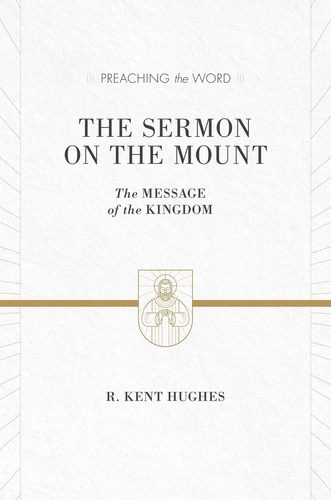
Preaching the Word - The Sermon on the Mount
The three chapters of Matthew known as the Sermon on the Mount contain truths so rich and powerful that even a lifetime of study could not exhaust their depths. For centuries, Jesus’s majestic portrait of the kingdom of heaven and his unparalleled instructions for godliness have captivated Christians and non-Christians alike. In this classic commentary, now revised with a fresh look and ESV Bible references, seasoned pastor R. Kent Hughes guides readers through this glorious portion of the Bible with exegetical precision, expositional clarity, and practical sensitivity. Whether used by preachers, small group leaders, or individual laypersons, this resource will prove invaluable for illuminating the Sermon on the Mount’s enduring power to enliven hearts and transform minds.
Preaching the Word - The Song of Solomon

Preaching the Word - The Song of Solomon
Our culture holds the megaphone when it comes to talking about sex today. Yet the church has maintained a reputation for keeping quiet, hesitant to teach people about this sacred aspect of life. The Song of Solomon, however, holds nothing back as it sings loudly about the holy practice of sexuality and pushes us into the conversation with godly theology.
While this biblical text has been subject to a broader range of interpretation probably than any other book in the Bible, Wisdom Literature expert Doug O’Donnell offers this comprehensible guide to help uncoil its complexities and solve its riddles. He explores the poetry, themes, and wisdom of this song from a Christocentric perspective, and gives us a profound, rich, and witty reflection that encourages right thinking and behavior.
Showing how this “song of songs” is meant to teach us about biblical sexuality and God’s heart for his people, O’Donnell elucidates on the greatest subject of all time—love.
Preaching the Word: 1 Kings — PTW
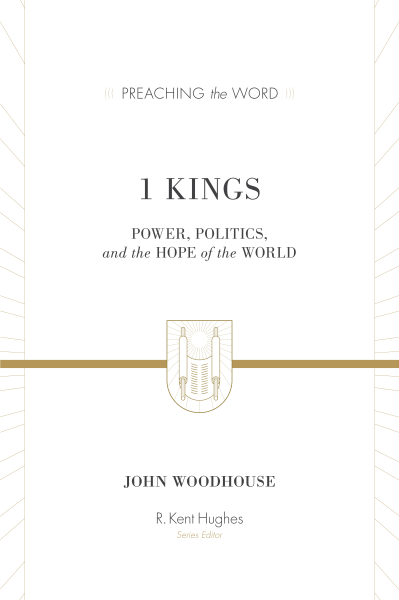
Preaching the Word: 1 Kings — PTW
John Woodhouse walks us through this book passage by passage as it reveals how God’s purpose for the kings reaches far beyond what they could accomplish in their lifetimes. Their lives are part of a greater story, bearing witness about the King of kings, Jesus Christ, the Savior of the world—building and strengthening our faith as we set our eyes on the kingdom that will last forever.
Reviews
“John Woodhouse’s commentary on 1 Kings is scintillating. It is characteristically full of sharp and original insight, searching application, and a refreshing, insistent focus on Jesus and his gospel as foreshadowed in the book of Kings. I am confident it will inspire many teachers and preachers to engage God’s people with the gospel treasure of this neglected part of Scripture.” — Kanishka Raffel, Anglican Dean of Sydney“With his usual precision and profound insight, Woodhouse digs up the treasures and wisdom of the gospel in this commentary. Readers will not only learn to expound the narrative of 1 Kings, but will also have their own hearts expounded and edified by the truth and hope of the gospel. Eight hundred pages full of treasures have shown me the glorious promise we have in Jesus Christ more clearly, more truly, and more deeply than I have seen it before. It is a joy to recommend this book to all fellow servants of Christ.” — Hank Lee, Assistant Minister, Enfield & Strathfield Anglican Church, Strathfield, Australia
John Woodhouse (DPhil, Victoria University of Manchester) served as principal of Moore Theological College in Sydney, Australia, from 2002 to 2013. Previously, he worked in pastoral ministry in a suburb of Sydney. He has published articles in various academic journals and is the author of two volumes in Crossway’s Preaching the Word commentary series.
Proverbs (Preacher's Outline & Sermon Bible Series)
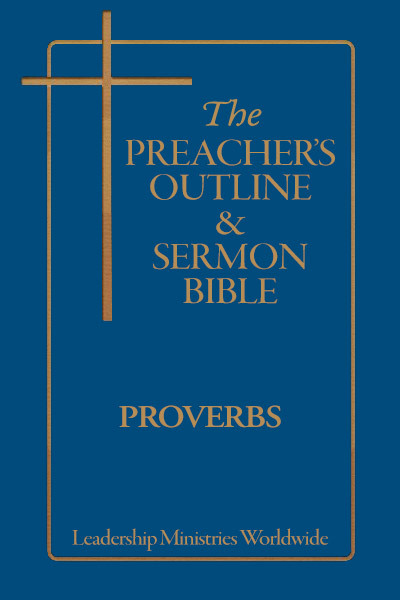
Proverbs (Preacher's Outline & Sermon Bible Series)
The Preacher’s Outline & Sermon Bible® (POSB) is a practical and comprehensive commentary set that gives the pastor or teacher everything they need to preach or teach God’s Word. Covering every book of the Bible, POSB is the perfect resource for expository or topical teaching.
With over a million copies sold in print, POSB is unlike any other commentary you will encounter. Each volume gives you detailed, verse-by-verse exposition for every Bible passage. Along with the biblical commentary, POSB includes extensive outlines with sub-points, thoughts on practical application, deeper studies on key biblical topics and themes, and full cross references.
You will quickly see the added value and ease of use that comes with having this commentary in your Olive Tree library. The Olive Tree edition separates the outlines and commentary to make POSB even easier to use. Instead of scrolling back and forth (or flipping pages), you can see the commentary and outlines side-by-side as you study or prepare your sermon. POSB is also fully functional with the Resource Guide and is configured to help you get to the information you need quickly. You can both drill down to the verse you want to study and easily find all the introductory material on each book of the Bible.
The Preacher’s Outline and Sermon Bible makes it easy to create life-changing sermons and lessons. Everything you need to understand any passage of the Bible is right at your fingertips. And this resource is not just for preachers and teachers; it’s perfect for any Christian who wants to know God’s Word better.
POSB features include:
- Detailed outlines for every book of the Bible
- Well researched and easy to read commentary
- Practical application for godly living
- Deeper studies to dive into key topics and themes
- Full text cross references (no need to look them up)
Proverbs, Ecclesiastes, Song of Solomon: Ancient Christian Commentary on Scripture (ACCS)

Proverbs, Ecclesiastes, Song of Solomon: Ancient Christian Commentary on Scripture (ACCS)
The Ancient Christian Commentary on Scripture does what very few of today's students of the Bible could do for themselves. With the aid of computer technology, the vast array of writings from the church fathers—including much that is available only in the ancient languages—have been combed for their comment on Scripture. From these results, scholars with a deep knowledge of the fathers and a heart for the church have hand-selected material for each volume, shaping, annotating and introducing it to today's readers. Each portion of commentary has been chosen for its salient insight, its rhetorical power and its faithful representation of the consensual exegesis of the early church.
The Ancient Christian Commentary on Scripture is an ecumenical project, promoting a vital link of communication between the varied Christian traditions of today and their common ancient ancestors in the faith. On this shared ground, we listen as leading pastoral theologians of seven centuries gather around the text of Scripture and offer their best theological, spiritual and pastoral insights.
Today the historical-critical method of interpretation has nearly exhausted its claim on the biblical text and on the church. In its wake there is a widespread yearning among Christian individuals and communities for the wholesome, the deep and the enduring. The Ancient Christian Commentary on Scripture does not seek to replace those excellent commentaries that have been produced in the twentieth century. Rather, it supplements them, framing them with interpretive voices that have long sustained the church and only recently have fallen silent. It invites us to listen with appreciative ears and sympathetic minds as our ancient ancestors in the faith describe and interpret the scriptural vistas as they see them.
The Ancient Christian Commentary on Scripture is a postcritical revival of the early commentary tradition known as the glossa ordinaria, a text artfully elaborated with ancient and authoritative reflections and insights. An uncommon companion for theological interpretation, spiritual reading, and wholesome teaching and preaching.
About the Proverbs, Ecclesiastes, Song of Solomon volume:
Among the Wisdom Literature of the Old Testament, Proverbs, Ecclesiastes and the Song of Solomon were all thought by the early church fathers to have derived from the hand of Solomon. To their minds the finest wisdom about the deeper issues of life prior to the time of God's taking human form in Jesus Christ was to be found in these books. As in all the Old Testament they were quick to find types and intimations of Christ and his church which would make the ancient Word relevant to the Christians of their day.
Of extant commentaries on Ecclesiastes none is so profound as the eight homilies of Gregory of Nyssa, even though they cover only the first three chapters of the book. Joining Gregory among those most frequently excerpted in this volume are Augustine, Ambrose, Gregory the Great, Origen, John Cassian, John Chrysostom, Athanasius, Bede the Venerable and Jerome. Gregory of Nazianzus, Basil the Great and Cyril of Jerusalem lead a cast of other less frequently cited fathers, and then there remains a large cast of supporting players, some of whose work is translated here into English for the first time.
This volume edited by J. Robert Wright thus offers a rich trove of wisdom on Wisdom for the enrichment of the church today.
Proverbs: Bible Speaks Today (BST)
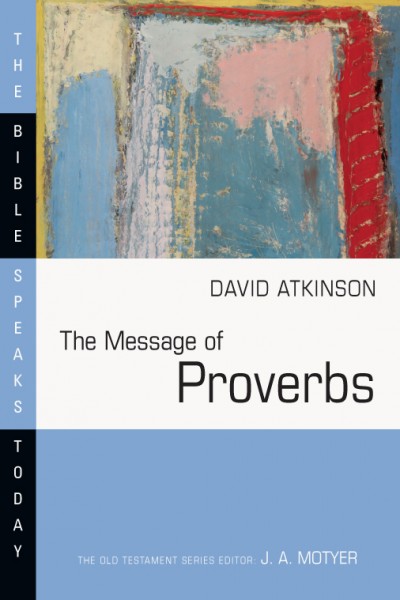
Proverbs: Bible Speaks Today (BST)
The book of Proverbs is the most practical book in the Bible. Its instruction in the art of living has been long tried and long proven. Its proverbial seeds of discernment are ready to be planted and rooted in the receptive soil of Wisdom's sons and daughters today.
In The Message of Proverbs the ancient voice of Lady Wisdom cries out again. She summons us to the life skills of godliness and helps us say no to the foolish and destructive enticements that inhabit the malls, campuses, housing divisions and office buildings of the postmodern world.But as much as we glean from the surface of Proverbs, there remains still more in its depths. David Atkinson's commentary wonderfully illumines the ancient cultural and religious background of the discourses and sayings of Proverbs. Wisdom's values are brought into sharp relief. More important, Atkinson brings the wisdom of Proverbs into conversation with the wisdom of God now more fully displayed in Christ. In this way the place of Proverbs in the pattern of God's Word is clearly accented.
About the Bible Speaks Today (BST) Series:
Edited by J.A. Motyer and the late John R. W. Stott, the Bible Speaks Today commentaries are characterized by what Stott called a "threefold ideal . . . to expound the biblical text with accuracy, to relate it to contemporary life and to be readable." As such, each contributor in this series is both a noted scholar and a working pastor.
The BST series, now complete, covers all sixty-six books of the bible (Old and New Testaments) in fifty-five volumes. If you preach or teach from Scripture, the Bible Speaks Today series will help you apply the timeless biblical message to the everyday experiences of your listeners. And if you study the Bible on your own, these volumes will be a helpful resource focusing on the significance of God's Word for your own life and work.
Psalms (2 Vols.): Bible Speaks Today (BST)

Psalms (2 Vols.): Bible Speaks Today (BST)
The book of Psalms is a favorite of Christians, even though we frequently read it in portions and pieces, hopscotching through the familiar and avoiding the odd, the unpleasant and the difficult. But though the individual psalms arose from an assortment of times, experiences and settings, the book is composed in a deliberate pattern, not as a random anthology. The meaning of the Psalms is discovered in this pattern and order.
Michael Wilcock has written a sort of travel guide to the Psalms. In the first volume, he invites us to begin our journey through the gateway of Psalms 1 and 2, with their summons to obedience. In the second volume, The Message of Psalms 73--150, he ends with Psalm 150, singing its song of praise. In between we pass through all the "yes, buts" of faith--the conflicts, the burdens, the mysteries and the sufferings of life. In these laments and praises, hymns and liturgies, the Bible continues to speak clearly today.
About the Bible Speaks Today (BST) Series:
Edited by J.A. Motyer and the late John R. W. Stott, the Bible Speaks Today commentaries are characterized by what Stott called a "threefold ideal . . . to expound the biblical text with accuracy, to relate it to contemporary life and to be readable." As such, each contributor in this series is both a noted scholar and a working pastor.
The BST series, now complete, covers all sixty-six books of the bible (Old and New Testaments) in fifty-five volumes. If you preach or teach from Scripture, the Bible Speaks Today series will help you apply the timeless biblical message to the everyday experiences of your listeners. And if you study the Bible on your own, these volumes will be a helpful resource focusing on the significance of God's Word for your own life and work.
Psalms 1-41 (Preacher's Outline & Sermon Bible Series)
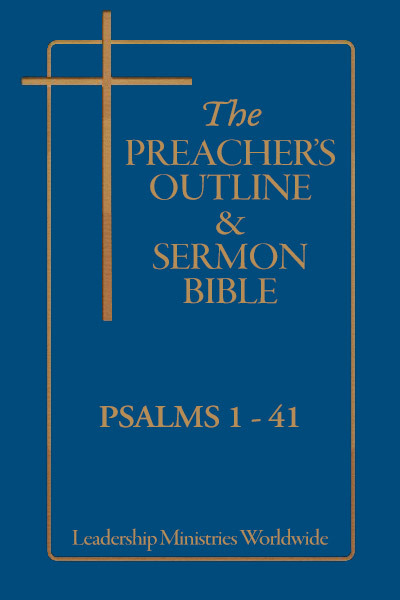
Psalms 1-41 (Preacher's Outline & Sermon Bible Series)
The Preacher’s Outline & Sermon Bible® (POSB) is a practical and comprehensive commentary set that gives the pastor or teacher everything they need to preach or teach God’s Word. Covering every book of the Bible, POSB is the perfect resource for expository or topical teaching.
With over a million copies sold in print, POSB is unlike any other commentary you will encounter. Each volume gives you detailed, verse-by-verse exposition for every Bible passage. Along with the biblical commentary, POSB includes extensive outlines with sub-points, thoughts on practical application, deeper studies on key biblical topics and themes, and full cross references.
You will quickly see the added value and ease of use that comes with having this commentary in your Olive Tree library. The Olive Tree edition separates the outlines and commentary to make POSB even easier to use. Instead of scrolling back and forth (or flipping pages), you can see the commentary and outlines side-by-side as you study or prepare your sermon. POSB is also fully functional with the Resource Guide and is configured to help you get to the information you need quickly. You can both drill down to the verse you want to study and easily find all the introductory material on each book of the Bible.
The Preacher’s Outline and Sermon Bible makes it easy to create life-changing sermons and lessons. Everything you need to understand any passage of the Bible is right at your fingertips. And this resource is not just for preachers and teachers; it’s perfect for any Christian who wants to know God’s Word better.
POSB features include:
- Detailed outlines for every book of the Bible
- Well researched and easy to read commentary
- Practical application for godly living
- Deeper studies to dive into key topics and themes
- Full text cross references (no need to look them up)
Psalms 1-50: Ancient Christian Commentary on Scripture (ACCS)

Psalms 1-50: Ancient Christian Commentary on Scripture (ACCS)
The Ancient Christian Commentary on Scripture does what very few of today's students of the Bible could do for themselves. With the aid of computer technology, the vast array of writings from the church fathers—including much that is available only in the ancient languages—have been combed for their comment on Scripture. From these results, scholars with a deep knowledge of the fathers and a heart for the church have hand-selected material for each volume, shaping, annotating and introducing it to today's readers. Each portion of commentary has been chosen for its salient insight, its rhetorical power and its faithful representation of the consensual exegesis of the early church.
The Ancient Christian Commentary on Scripture is an ecumenical project, promoting a vital link of communication between the varied Christian traditions of today and their common ancient ancestors in the faith. On this shared ground, we listen as leading pastoral theologians of seven centuries gather around the text of Scripture and offer their best theological, spiritual and pastoral insights.
Today the historical-critical method of interpretation has nearly exhausted its claim on the biblical text and on the church. In its wake there is a widespread yearning among Christian individuals and communities for the wholesome, the deep and the enduring. The Ancient Christian Commentary on Scripture does not seek to replace those excellent commentaries that have been produced in the twentieth century. Rather, it supplements them, framing them with interpretive voices that have long sustained the church and only recently have fallen silent. It invites us to listen with appreciative ears and sympathetic minds as our ancient ancestors in the faith describe and interpret the scriptural vistas as they see them.
The Ancient Christian Commentary on Scripture is a postcritical revival of the early commentary tradition known as the glossa ordinaria, a text artfully elaborated with ancient and authoritative reflections and insights. An uncommon companion for theological interpretation, spiritual reading, and wholesome teaching and preaching.
About the Psalms 1-50 volume:
The Psalms have long served a vital role in the individual and corporate lives of Christians, expressing the full range of human emotions, including some that we are ashamed to admit. The Psalms reverberate with joy, groan in pain, whimper with sadness, grumble in disappointment and rage with anger.
The church fathers employed the Psalms widely. In liturgy they used them both as hymns and as Scripture readings. Within them they found pointers to Jesus both as Son of God and as Messiah. They also employed the Psalms widely as support for other New Testament teachings, as counsel on morals and as forms for prayer.
But the church fathers found more than pastoral insight in the Psalms. They found apologetic and doctrinal insight as well, as is attested by the more than sixty-five authors and more than 160 works excerpted in this commentary.
Especially noteworthy among the Greek-speaking authors cited are Hippolytus, Origen, Eusebius of Caesarea, Athanasius, Basil of Caesarea, Gregory of Nyssa, Didymus the Blind, Evagrius of Pontus, Diodore of Tarsus, John Chrysostom, Asterius the Homilist, Theodore of Mopsuestia, Theodoret of Cyr, Cyril of Alexandria and Hesychius of Jerusalem. Among noteworthy Latin authors we find Hilary of Poitiers, Ambrose of Milan, Jerome, Augustine, Arnobius the Younger and Cassiodorus.
Readers of these selections, some of which appear here for the first time in English, will glean from a rich treasury of deep devotion and profound theological reflection.
Psalms 107-150 (Preacher's Outline & Sermon Bible Series)
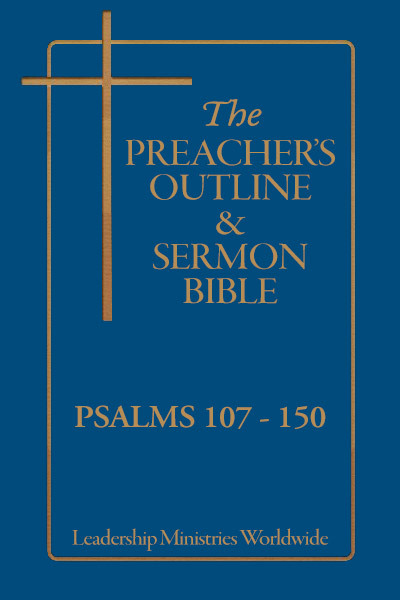
Psalms 107-150 (Preacher's Outline & Sermon Bible Series)
The Preacher’s Outline & Sermon Bible® (POSB) is a practical and comprehensive commentary set that gives the pastor or teacher everything they need to preach or teach God’s Word. Covering every book of the Bible, POSB is the perfect resource for expository or topical teaching.
With over a million copies sold in print, POSB is unlike any other commentary you will encounter. Each volume gives you detailed, verse-by-verse exposition for every Bible passage. Along with the biblical commentary, POSB includes extensive outlines with sub-points, thoughts on practical application, deeper studies on key biblical topics and themes, and full cross references.
Look Inside The Preacher’s Outline & Sermon Bible
You will quickly see the added value and ease of use that comes with having this commentary in your Olive Tree library. The Olive Tree edition separates the outlines and commentary to make POSB even easier to use. Instead of scrolling back and forth (or flipping pages), you can see the commentary and outlines side-by-side as you study or prepare your sermon. POSB is also fully functional with the Resource Guide and is configured to help you get to the information you need quickly. You can both drill down to the verse you want to study and easily find all the introductory material on each book of the Bible.
The accompanying New Testament Master Subject Index makes it easy to perform a topical study. The Olive Tree edition allows you to use the resource like a Bible dictionary, so you can get to your topic quickly. Each topic links to the POSB commentary text and also includes links to related subjects.
The Preacher’s Outline and Sermon Bible makes it easy to create life-changing sermons and lessons. Everything you need to understand any passage of the Bible is right at your fingertips. And this resource is not just for preachers and teachers; it’s perfect for any Christian who wants to know God’s Word better.
POSB features include:
- Detailed outlines for every book of the Bible
- Well researched and easy to read commentary
- Practical application for godly living
- Deeper studies to dive into key topics and themes
- Full text cross references (no need to look them up)
Psalms 42-106 (Preacher's Outline & Sermon Bible Series)
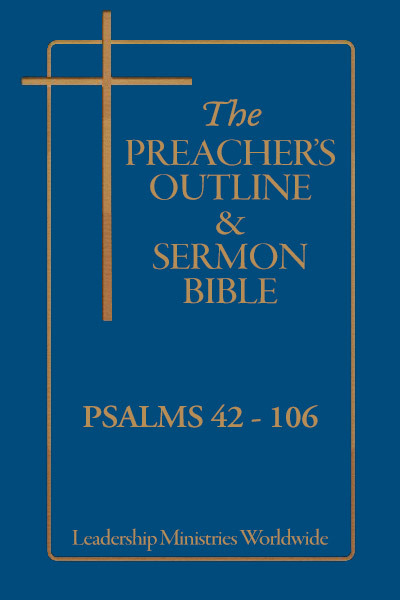
Psalms 42-106 (Preacher's Outline & Sermon Bible Series)
The Preacher’s Outline & Sermon Bible® (POSB) is a practical and comprehensive commentary set that gives the pastor or teacher everything they need to preach or teach God’s Word. Covering every book of the Bible, POSB is the perfect resource for expository or topical teaching.
With over a million copies sold in print, POSB is unlike any other commentary you will encounter. Each volume gives you detailed, verse-by-verse exposition for every Bible passage. Along with the biblical commentary, POSB includes extensive outlines with sub-points, thoughts on practical application, deeper studies on key biblical topics and themes, and full cross references.
You will quickly see the added value and ease of use that comes with having this commentary in your Olive Tree library. The Olive Tree edition separates the outlines and commentary to make POSB even easier to use. Instead of scrolling back and forth (or flipping pages), you can see the commentary and outlines side-by-side as you study or prepare your sermon. POSB is also fully functional with the Resource Guide and is configured to help you get to the information you need quickly. You can both drill down to the verse you want to study and easily find all the introductory material on each book of the Bible.
The Preacher’s Outline and Sermon Bible makes it easy to create life-changing sermons and lessons. Everything you need to understand any passage of the Bible is right at your fingertips. And this resource is not just for preachers and teachers; it’s perfect for any Christian who wants to know God’s Word better.
POSB features include:
- Detailed outlines for every book of the Bible
- Well researched and easy to read commentary
- Practical application for godly living
- Deeper studies to dive into key topics and themes
- Full text cross references (no need to look them up)
Psalms 51-150: Ancient Christian Commentary on Scripture (ACCS)

Psalms 51-150: Ancient Christian Commentary on Scripture (ACCS)
The Ancient Christian Commentary on Scripture does what very few of today's students of the Bible could do for themselves. With the aid of computer technology, the vast array of writings from the church fathers—including much that is available only in the ancient languages—have been combed for their comment on Scripture. From these results, scholars with a deep knowledge of the fathers and a heart for the church have hand-selected material for each volume, shaping, annotating and introducing it to today's readers. Each portion of commentary has been chosen for its salient insight, its rhetorical power and its faithful representation of the consensual exegesis of the early church.
The Ancient Christian Commentary on Scripture is an ecumenical project, promoting a vital link of communication between the varied Christian traditions of today and their common ancient ancestors in the faith. On this shared ground, we listen as leading pastoral theologians of seven centuries gather around the text of Scripture and offer their best theological, spiritual and pastoral insights.
Today the historical-critical method of interpretation has nearly exhausted its claim on the biblical text and on the church. In its wake there is a widespread yearning among Christian individuals and communities for the wholesome, the deep and the enduring. The Ancient Christian Commentary on Scripture does not seek to replace those excellent commentaries that have been produced in the twentieth century. Rather, it supplements them, framing them with interpretive voices that have long sustained the church and only recently have fallen silent. It invites us to listen with appreciative ears and sympathetic minds as our ancient ancestors in the faith describe and interpret the scriptural vistas as they see them.
The Ancient Christian Commentary on Scripture is a postcritical revival of the early commentary tradition known as the glossa ordinaria, a text artfully elaborated with ancient and authoritative reflections and insights. An uncommon companion for theological interpretation, spiritual reading, and wholesome teaching and preaching.
About the Psalms 51-150 volume:
The Psalms have long served a vital role in the individual and corporate lives of Christians, expressing the full range of human emotions, including some that we are ashamed to admit. The Psalms reverberate with joy, groan in pain, whimper with sadness, grumble in disappointment and rage with anger.
The church fathers employed the Psalms widely. In liturgy they used them both as hymns and as Scripture readings. Within them they found pointers to Jesus both as Son of God and as Messiah. They also employed the Psalms widely as support for other New Testament teachings, as counsel on morals and as forms for prayer.
Especially noteworthy was their use of Psalms in the great doctrinal controversies. The Psalms were used to oppose subordinationism, modalism, Arianism, Apollinarianism, Nestorianism, Eutychianism and Monophysitism, among others.
More than fifty church fathers are cited here from Ambrose to Zephyrinus. From the British Isles, Gaul and the Iberian Peninsula, we find Hilary of Poitiers, Prudentius, John Cassian, Valerian of Cimiez, Salvian the Presbyter, Caesarius of Arles, Martin of Bruga, Braulio of Saragossa and Bede. From Rome and Italy, we find Clement, Justin Martyr, Callistus, Hippolytus, Novatian, Rufinus, Maximus of Turin, Peter Chrysologus, Leo the Great, Cassiodorus and Gregory the Great. Carthage and North Africa are represented by Tertullian, Cyprian, Augustine and Fulgentius. Fathers from Alexandria and Egypt include Clement, Origen, Dionysius, Pachomius, Athanasius, Cyril and Poemen. Constantinople and Asia Minor supply the Great Cappadocians--Basil the Great and the two Gregorys, from Nazianzus and Nyssa--plus Evagrius of Pontus and Nicetas of Remesiana. From Antioch and Syria we find Ephrem, John Chrysostom, Theodore of Mopsuestia, Theodoret of Cyr, Philoxenus of Mabbug, Sahdona and John of Damascus. Finally, Jerusalem, Palestine and Mesopotamia are represented by Eusebius of Caesarea, Aphrahat, Cyril, Jacob of Sarug, Jerome and Isaac of Nineveh.
Readers of these selections, some appearing in English for the first time, will glean from a rich treasury of deep devotion and profound theological reflection.






- Adapt your commentary collection month-to-month based on the book or books you are studying.
- Build your commentary library strategically without hundreds of dollars of upfront investment.
- Never get stuck with commentaries you rarely use - swap them out each month as your needs change.



